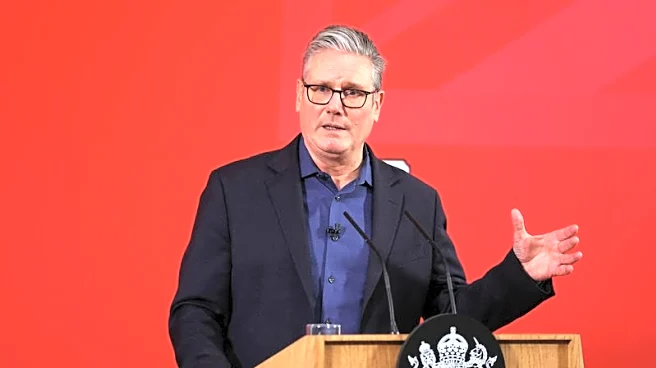What is the story about?
What's Happening?
Israeli Prime Minister Benjamin Netanyahu has denied reports of hunger in Gaza, despite increasing evidence of malnutrition among children. The denial comes as the United Nations reports nearly 12,000 children under five in Gaza suffering from acute malnutrition, with over 2,500 in severe condition. The situation has been exacerbated by Israel's previous restrictions on food and medical supplies, which were intended to pressure Hamas. Although Israel has recently increased the flow of supplies, the cost of food remains high, and many families cannot afford it. The World Health Organization warns that the numbers of malnourished children are likely underestimated. The situation is further complicated by a planned Israeli offensive that could disrupt food deliveries and cause further displacement.
Why It's Important?
The humanitarian crisis in Gaza has significant implications for regional stability and international relations. The denial of hunger by Netanyahu contrasts with reports from international organizations, potentially affecting Israel's diplomatic standing. The malnutrition crisis highlights the severe impact of prolonged conflict on civilian populations, particularly children, and raises ethical concerns about the use of blockades as a political tool. The situation also underscores the challenges faced by humanitarian organizations in delivering aid amidst ongoing hostilities. The potential for further military action could exacerbate the crisis, leading to increased international pressure on Israel and calls for a resolution to the conflict.
What's Next?
The international community is likely to increase pressure on Israel to ensure the safe delivery of humanitarian aid to Gaza. Humanitarian organizations may seek to expand their operations to address the severe malnutrition crisis, while diplomatic efforts could intensify to prevent further military escalation. The planned Israeli offensive could lead to new waves of displacement, complicating aid efforts and potentially drawing condemnation from global leaders. Monitoring the situation will be crucial to understanding the evolving humanitarian needs and the potential for a broader resolution to the conflict.
Beyond the Headlines
The crisis in Gaza raises broader questions about the ethics of using blockades in conflict zones and the responsibility of international actors to protect vulnerable populations. The situation also highlights the long-term impacts of conflict on public health and the importance of addressing underlying political issues to prevent recurring humanitarian crises. The role of media in shaping international perceptions and policy responses is also significant, as differing narratives about the situation in Gaza could influence global opinion and diplomatic actions.

















